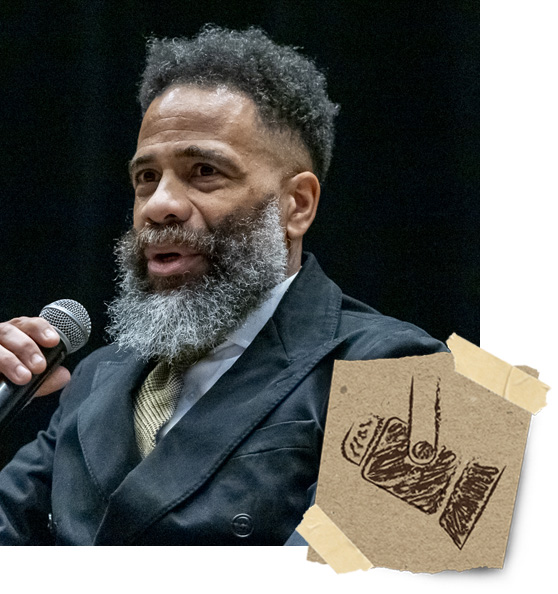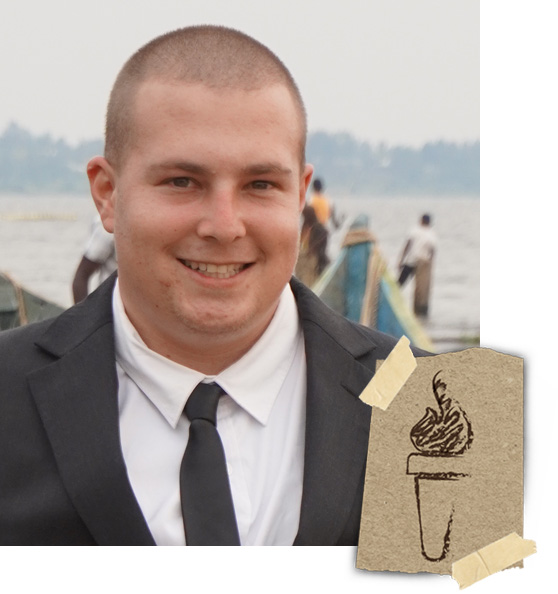Access Champion: Dr. Walter Hawthorne
August 19, 2025 - Emily Jodway
 International Day for the Remembrance of the Slave Trade and its Aboliton is recognized each year on August 23. It marks the beginning of the uprising in Saint Domigue (modern Haiti) against French colonial rule in 1791, which played a crucial role in abolishing the transatlantic slave trade. The slave trade shaped the world in ways that are still apparent today. Understanding its history and the histories of those who were enslaved and fought against oppression is an important part of understanding national and global history. Dr. Walter Hawthorne, Professor of African and Digital History in the MSU Department of History and African Studies Center, is one such researcher doing important work aimed at painting the full picture of the transatlantic slave trade and the lives of enslaved individuals.
International Day for the Remembrance of the Slave Trade and its Aboliton is recognized each year on August 23. It marks the beginning of the uprising in Saint Domigue (modern Haiti) against French colonial rule in 1791, which played a crucial role in abolishing the transatlantic slave trade. The slave trade shaped the world in ways that are still apparent today. Understanding its history and the histories of those who were enslaved and fought against oppression is an important part of understanding national and global history. Dr. Walter Hawthorne, Professor of African and Digital History in the MSU Department of History and African Studies Center, is one such researcher doing important work aimed at painting the full picture of the transatlantic slave trade and the lives of enslaved individuals.
His areas of research specialization are Upper Guinea, the Atlantic, and Brazil. In partnership with MSU’s Matrix: Center for Digital Humanities & Social Sciences, he has been a lead investigator or research team member on a host of digital projects aimed at digitizing, analyzing, and making widely available records of named enslaved and freed individuals.
Growing up in Virginia, Hawthorne was originally interested in Virginian and American history, but quickly realized, he explained, “If you’re going to study the history of agriculture or the development of Virginia over time, from its founding at Jamestown moving forward, slavery in the Atlantic and the slave trade are going to be part of that.” While earning his bachelor’s degree at Hampden-Sydney College and his master’s at Maryland, he began taking classes on African history sought to better understand the history of the southern states of the United States as it relates to slavery and the Atlantic slave trade, which ultimately led to the pursuit of a PhD. At Stanford, where he completed his PhD in History, Hawthorne centered his studies around African History and the transatlantic slave trade. The Portuguese he had studied in college came in handy as he shifted his focus to Lusophone regions of West Africa, which played a central role in the transportation of enslaved people to the Americas. After completing his PhD, Hawthorne was an adjunct faculty member at University of Vermont and then joined the History Department African Studies Center at Ohio University. When a position opened up at Michigan State, he jumped at the opportunity.
“Michigan State is, for Africanists, one of those dream jobs,” he explained. “It’s got one of the oldest PhD programs in African History.” In the early 2000s, Michigan State was hiring more faculty in the hopes of revitalizing the African history program in the wake of retirements. “I was interested in coming here because of its long history of excellence in African studies, and for the chance to train PhD students.” Since arriving at Michigan State 20 years ago, Hawthorne and his fellow Africanist historians, Nwando Achebe, Peter Alegi, and Michelle Moyd, have succeeded in their efforts to keep MSU’s PhD program in African history as the model for programs across the country. It has ranked as high as #1 in the country in national surveys. MSU’s wealth of library and African Studies Center resources, College and University administrative support, and language programs that provide opportunities for students to learn languages spoken on the continent make MSU’s PhD program in African history one of the most well-rounded among its peers. “There is no place in the country that is more wed to research on the continent, to cultivating excellent PhD students who we send off to other places to study and teach Africa’s history, and to fostering an outstanding Africana library collection.”
One of Hawthorne’s favorite parts about being an educator is the opportunity to assist PhD students in their preparation for their future scholarly careers. “There’s something particularly rewarding about working with a student for five or six years and watching them go off to another university and teach students from the knowledge that they gained here, and knowing that as a group, we are helping to cultivate this study of Africa at other universities,” he said. Diversity in the classroom plays an important role in this preparation. Students in the program hail from not only states across the country, but places like Kenya, Ghana, Nigeria, and The Gambia, to name a few. In order to properly study another part of the world, Hawthorne explains, it’s best to understand the full picture of that part of the world, and to hear from people who grew up there and have experienced it themselves. “You get a range of experiences and perspectives,” he said. “That’s the kind of seminar you want, one where you know that people are actively engaged in debate and listening to one another and approaching things from different perspectives.”
During his time at Michigan State, Hawthorne has served in a variety of administrative roles, and was Chair of the Department of History for eight years. “It was incredible working with higher administrators, and also the faculty in the history department, to think about ways we could build the department in exciting and new ways,” he said.
One of these efforts was the creation of the Lab for Education and Advancement in Digital Research (LEADr), which works hand in hand with Matrix: Center for Digital Humanities and Social Sciences to teach undergraduate students about digital methodologies in Social Science research. His goal was to introduce the methods used for research projects by faculty and graduate students in Matrix in classrooms. Matrix itself has given Hawthorne one of his greatest opportunities, the creation of the digital history project Enslaved: Peoples of the Historial Slave Trade, which is also known as Enslaved.org,. Hawthorne is passionate about making historical materials and projects more accessible to the public, and the digitization of slave biographics and archival cataloging used in Enslaved.org is just one of the ways he and other MSU researchers have made this possible. The project has been lauded as a tool for educating people about slavery and for aiding in historical discovery in a variety of cutting-edge ways.
“As citizens of the globe, we’re all obliged to understand the world that we live in, and Africa is a central part of that world,” he said. “Slavery as an institution was central to the development of the Americas and our own nation. The institution relied on the forced migration of people, who brought in new cultures … the fact is that the labor of enslaved people is what initially built the country that we live in today. Understanding that African element and Africa itself is central to understanding who we are as Americans today.”
When it comes to recognizing International Day for the Remembrance of the Slave Trade and its Abolition, Hawthorne says, it’s important to remember that the slavery and the slave trade were about the commodification, exploitation, and control over the lives of people of color. The International Day of Remembrance is an opportunity to reflect on what we have overcome and to celebrate the long struggle for freedom that those who were enslaved orchestrated here in North America and elsewhere in the Atlantic world.The day is an opportunity to consider the work that still needs to be done to create a better and more just world for all.
“One of the significant things about International Day for the Remembrance of the Slave Trade and its Abolition is recognizing the end of an institution that denied people rights based on race, denied people the basic human rights that we all take for granted today. The day can give us hope that we can overcome other forms of exploitation that people in our society and elsewhere face today.”
Honorees’ views are their own and do not necessarily reflect those of the College of Social Science.
Read more:

Access Spotlight
Alumni
Dr. Pero Dagbovie
This month, we “spotlight” Dr. Pero Dagbovie, University Distinguished Professor of African American History, administrator, and a recent author of a book exploring the long durée of African American experiences at MSU.

Access Torch
Student
Zachary Levy
Zachary Levy is a History department graduate student whose work focuses on the slave trade and enslaved people of eastern Africa.

Access Matters
We strive to cultivate an inclusive and welcoming college environment that celebrates a diversity of people, ideas, and perspectives.

